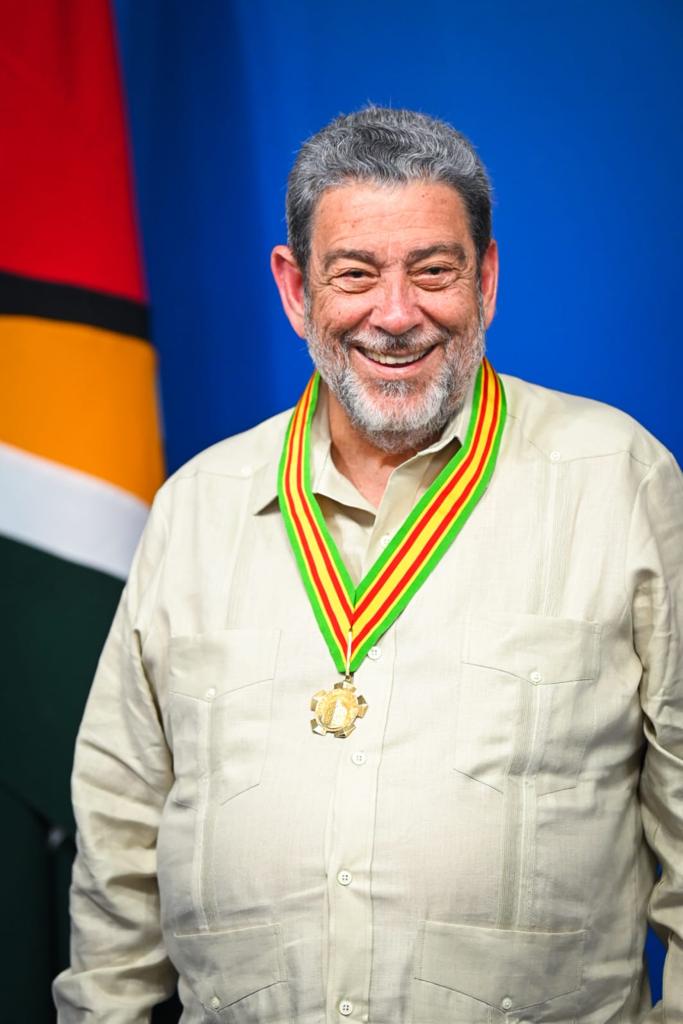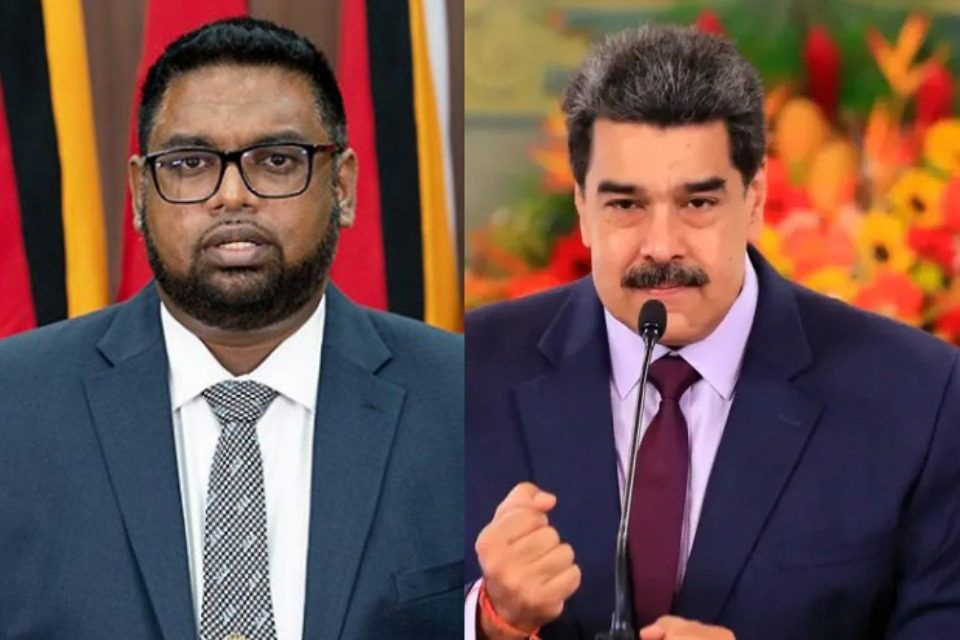Although he has agreed to a meeting with President Nicolas Maduro next Thursday in St. Vincent and the Grenadines, following mounting concern at Venezuela’s aggressive stance, President Irfaan Ali yesterday made it clear that this country’s land boundary is not up for bilateral discussion.
The opposition and government stood together in agreement with the decision yesterday as the matter is before the International Court of Justice (ICJ) and they jointly believe that process must be able to take its course, “so that it is settled within the confines of international law.”
“President Ali reiterated that Guyana’s land boundary is not up for discussion, as it is currently before the ICJ and, when adjudicated, will be fully respected by Guyana. The President, on numerous occasions, has made it explicitly clear that the case before the ICJ will not be an issue for bilateral discussions,” a statement from the Office of the President (OP) said.

OP disclosed that Ali was approached yesterday by the St. Vincent Prime Minister Ralph Gonsalves, about a meeting between Caracas and Georgetown, to be held in Kingstown which will be observed by a UN Under-Secretary General as well as representatives of Brazil, and CARICOM. It has been proposed that the Brazilian President be in attendance.
Ali, according to OP, was contacted by leaders representing the Community of Latin American and Caribbean States (CELAC), Brazil, and several bilateral partners, “encouraging dialogue with the President of the Bolivarian Republic of Venezuela.”
It said that on Friday evening, during an emergency meeting of the Heads of Government of CARICOM, the Heads had asked Ali to explore the possibility of a meeting with President Maduro in St. Vincent.
Ali however emphasised that Guyana is clear that the advancement of its “development agenda will not be compromised.”
“Our development partners and investors can be assured that there will be no changes nor alterations to existing arrangements,” the statement said.
In the letter sent by Prime Minister Gonsalves, with subject – `Re: Presidential meeting to be held in St. Vincent and the Grenadines under the auspices of CELAC and CARICOM on Thursday December 14, 2023 on matters consequential to the border controversy between Guyana and Venezuela’ – it outlined that both sides had agreed and both had asked that Brazil’s President Luiz Inácio Lula da Silva be present.
Dear brother
“Both of you have agreed with me for such a meeting to be held under the auspices of CELAC of which St. Vincent and the Grenadines is the Pro-Tempore President and CARICOM of which the current Chairman is the Commonwealth of Dominica. Both of you have also requested the distinguished presence of the esteemed President of the Federative Republic of Brazil, His Excellency Luiz Inácio Lula da Silva. An invitation is accordingly being sent to our dear brother, Lula,” the letter stated.
“Given the recent events and circumstances attendant upon the border controversy, the leaderships of CELAC and CARICOM have assessed, in the interest of all concerned, including our Caribbean and Latin American civilisations, the urgent need to de-escalate the conflict and institute an appropriate dialogue, face to face between the presidents of Guyana and Venezuela. Both of you have concurred with this assessment in the quest of peaceful co-existence, the application and respect for international law, and the avoidance of the use or threats of force. Both of you are on public record of committing to the Caribbean as a Zone of Peace and the maintenance of international law,” it added
Gonsalves’ missive pointed out that everyone was “aware that the government of Guyana is seeking the resolution of the border controversy through the processes of the International Court of Justice (ICJ) which is currently seized of the matter.”
“We are cognizant, too, that the government of Venezuela has rejected the path of the ICJ as the modality for resolution,” it continued.
Gonsalves noted that Guyana’s parliament has unanimously instructed the President not to discuss the border controversy with the government of Venezuela.
Over in Venezuela, he pointed out that, “The people of Venezuela have advised, overwhelmingly, in a consultative referendum on December 3, 2023, their government not to accept the jurisdiction of the ICJ in the matter of border controversy.”
Cemented
With the populace of both sides cemented in their respective stances, Gonsalves posited that both presidents will have to decide what is best.
“Clearly, each of you has to summon the proverbial wisdom of Solomon, the patience of Job, and the foresight of all the ancient prophets to engender good neighborliness in peace, justice, security, and prosperity for all concerned. There is thus much for each of you to raise and/or discuss on matters consequential to the border controversy even as you respect the advice, or more, of your respective peoples and Parliament/National Assembly,” he reasoned.
Both sides were told that they are free to suggest requisite modalities of the face-to-face dialogue, inclusive of the role of any named interlocutor(s).
Both Prime Minister Roosevelt Skerrit, Chair of CARICOM, and Gonsalves, as Pro-Tempore President of CELAC, he said, are available to assist in whatever constructive way both Presidents may suggest or require.
President Ali, has assured that he will continue to engage this country’s bilateral partners on defence cooperation pacts, as well as the ongoing range of political, social and economic arrangements.
President Ali also held a telephone discussion yesterday with Opposition Leader Aubrey Norton on the growing aggression by Caracas and the invitation for talks to be brokered by Gonsalves.
The Opposition Leader told this newspaper that when contacted, the President briefed him on how the talks came to be. He said that Ali informed that he had accepted and was told that while dialogue between the two countries is meaningful, the Opposition does not support the border matter being part of that meeting.
“We made very clear that the Guyana/Venezuela border is not to be on the agenda and it is to be dealt with by the ICJ,” Norton stressed.
Technical
Norton disclosed that he also advised Ali that he (Ali) should have “high-level technical advisors with him.” To his proposal, Norton said that the President relayed that he already had this preparation in place.
A statement released by the Opposition reiterated the parties’ position on the scope of talks.
“We believe that the meeting should seek to ensure the two states recommence bilateral discussions since they will open new vistas for good neighbourliness, and peace between our two states and peoples. It is the considered view of the Opposition that the two Leaders could continue to explore the expansion of bilateral issues which could improve the lives of the peoples of our two countries and contribute to the peaceful development of the Latin American and Caribbean region,” the statement said.
However, it also emphasised that, “The opposition believes that there must not be any discussions of the territorial controversy between our two countries as this matter is properly before the International Court of Justice (ICJ) and this process must be allowed to take its course so that it is settled within the confines of international law.”
The Parliamentary Opposition assured that it “remains committed to playing its role in the ongoing relationship between Guyana and Venezuela and will always work towards the protection of the Territorial Integrity and Sovereignty of our nation.”
Meanwhile, government yesterday assured that this country “has always been committed to international peace and security and the promotion of good neighbourly relations.”
The crisis in relations between Guyana and Venezuela was triggered by Caracas’s decision to convene a referendum on December 3rd which had as its objective the annexation of Guyana’s county of Essequibo. Guyana then approached the ICJ for provisional measures which were handed down on December 1st and which proscribed Caracas from taking any steps against Guyana’s control of Essequibo. Despite this, Maduro, on December 5th announced a seven-point plan which included the authorizing of oil exploration in an area around the Essequibo River, even though the territory is the subject of a controversy with Guyana. He also said that state oil company PDVSA and state iron and steel maker CVG will create divisions for the Essequibo region.
The state companies will “immediately proceed to create the division PDVSA Esequibo and CVG Esequibo and immediately we’ll proceed to give operating licenses for the exploration and exploitation of oil, gas and mines in our Guayana Esequiba,” he said on state television.
Maduro also said he proposed a law to the government-controlled legislature to create the new state which was later done. In addition to this, Maduro ordered that a new map that includes Essequibo be dispersed to sectors of the Bolivarian republic.
In a statement, made during the General Assembly of the Federal Council of Government, Maduro further announced that Venezuelan nationality will be granted to all individuals residing within the territory.
“The people have decided to nationalize all citizens in that territory with their Venezuelan identity card, acknowledging them as brothers of our country, and to create the state of Guayana Esequiba …We are going to seek justice and restore Venezuela’s rights over Guayana Esequiba. Our country will come together”.
Maduro also disclosed plans to create the Integral Defense Zone of “Guayana Esequiba”. This zone would be essentially administered by the Guyana Integral Defense Region and comprises three areas of integral development and 28 sectors within the Essequibo region. In the interim, Major General Rodriguez Cabello has been designated as Guayana Esequiba’s only political and administrative authority in the town that they are taking over, pending further legislative discussions on the subject.
Further, Maduro asked the relevant Vice Presidents and Ministers to support the initiative and provide all schools with a fresh map that shows the “new Venezuela” which has been created as a result of the December 3 decision.
Additionally, Maduro suggested a unique law to create national parks and environmental protection zones in “Guayana Esequiba”. These protected areas would work to protect the region’s biodiversity and encourage environmentally conscious travel.
“I propose to the National Assembly to approve a special law decreeing environmental protection areas in Guayana Esequiba and new protected national parks that will be centres of biodiversity and life tourism in Guyana Esequiba,” he said.
Unsettling
At 11.20 that night, Ali made a public broadcast denouncing the measures. “I address you on an unsettling development in relation to the unlawful claim by Venezuela to Guyana’s Essequibo region which constitutes more than two thirds of Guyana’s national territory. (Om Tuesday) President Maduro announced several measures which his government intends to take in enforcing the outcome of the referendum held on December 3, 2023.”
Ali said that since the announcement of the referendum he had made it clear that it was a direct threat to Guyana’s territory, sovereignty and political independence.
“Guyana views this as an imminent threat to its territorial integrity and will intensify precautionary measures to safeguard its territory”, Ali said in a Facebook address.
According to Ali, on Tuesday evening he spoke to the Secretary General of the United Nations, Antonio Guterres and several leaders “alerting them of these dangerous developments and the desperate actions of President Maduro that fly in the face of international law and constitute a grave threat to international peace and security.”
The matter has also been taken before the United Nations Security Council.
In addition to the referendum, Venezuela has employed bellicose language and there have been troop movements on its side of the border. It has also made repeated efforts to force direct talks with Guyana on the border controversy.





